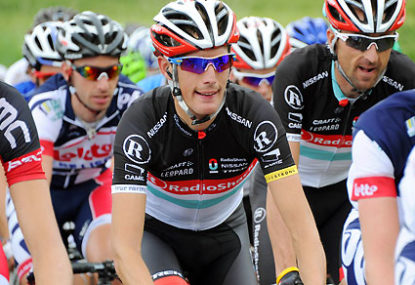'I've just won a stage of the Tour de France, mate!': Hindley grabs yellow jersey as Aussie blows Tour apart
Australia's Jai Hindley has said he is "lost for words" after a shock stage victory at the Tour de France earned him the leader's…

Stage 18 of the 2011 Tour de France, and Thomas Voeckler was fighting a daily battle to hold onto the yellow jersey. Cadel Evans was in second and hotly tipped to be in the prime position to snatch the lead from Voeckler that day.
The Schleck brothers were next in line, with Frank third and pre-race favourite Andy in fourth.
Yet it looked as if the race was slipping away from them, with Andy over a minute behind Evans.
With the tree highest climbs of that year’s Tour, and the highest finish in the history of the event, the stage was set for fireworks.
The Leopard Trek team had surrounded the brothers with climbers and workhorses, and the team came to the fore early on, sending Maxime Monfort and Joost Posthuma into the break. The peloton sat relaxed, waiting for moves to start on the final climb.
With the ‘chaingate’ incident of 2010 in his mind, Andy Schleck had other ideas, attacking on the second climb of the day.
The peloton sat in disbelief – nobody countered the attack, perhaps thinking the Luxembourger was committing suicide attacking so early.
What followed was the greatest attack in modern cycling, as Schleck utilised Monfort and Posthuma to pace his ride and manage his descending deficiency. Andy rode solo for over 60 kilometres up some of the toughest climbs in the history of the Tour and at one stage held a lead of 4:24 over the chase group, before Evans rode out of his skin to reduce the margin to under a minute.
The following day Schleck claimed the yellow jersey before his time-trialling deficiency gave the yellow to Evans in Paris.
Another second place, but the 2011 Tour de France will be remembered for ‘the ride’.
Schleck had long been touted the hottest talent in cycling, being likened to Laurent Fignon. A third-generation cyclist, he made his presence felt first at the 2007 Giro coming runner-up as a 21-year-old.
The following year he made his Tour de France debut and was equally impressive, riding teammate Carlos Sastre to victory grabbing his first young rider’s white jersey and a 12th place finish.
In 2009 he started his affinity with the Tour, coming runner-up and claiming another white jersey. 2010 was a similar story, although he was the dominant force before dropping his chain attacking Alberto Contador to lose 39 seconds and the Tour.
A failed doping test handed the 2010 Tour to Andy retrospectively, so he will be counted as among the great winners of the past, but he was determined to be a clear winner in years to come.
Another second place in 2011 but showing aggression, it seemed he was waiting for a Tour with more climbs and less time-trialling. He never got the chance with crashes, injuries, and abandonments filling 2012 and 2013.
With no results and a string of tail-end results, the 2013 Tour saw him filling the role of support act, but Schleck managed to finish inside the top 20, leaving us with hope that the champion still had some fight.
October 2014, at the age of 29, Andy Schleck retired from cycling, citing persistent knee issues. This ended a career of extreme highs but didn’t give the champion the chance to bow out on his own terms. We had all hoped to see Andy among the leading group heading up the Alps in Tours to come or the Schleck brothers providing attack after attack at Liege-Bastogne.
It wasn’t to be, as he emotionally farewelled the cycling world.
The greatest term of endearment came from Alberto Contador, who had been the centre of some of the great battles and controversies of modern Tours. Contador said Schleck was his greatest opponent, putting him above Chris Froome, Bradley Wiggins, and Vincenzo Nibali.
Andy Schleck was a once-in-a-generation cyclist who provided us with great memories, yet we may have never seen the best of.